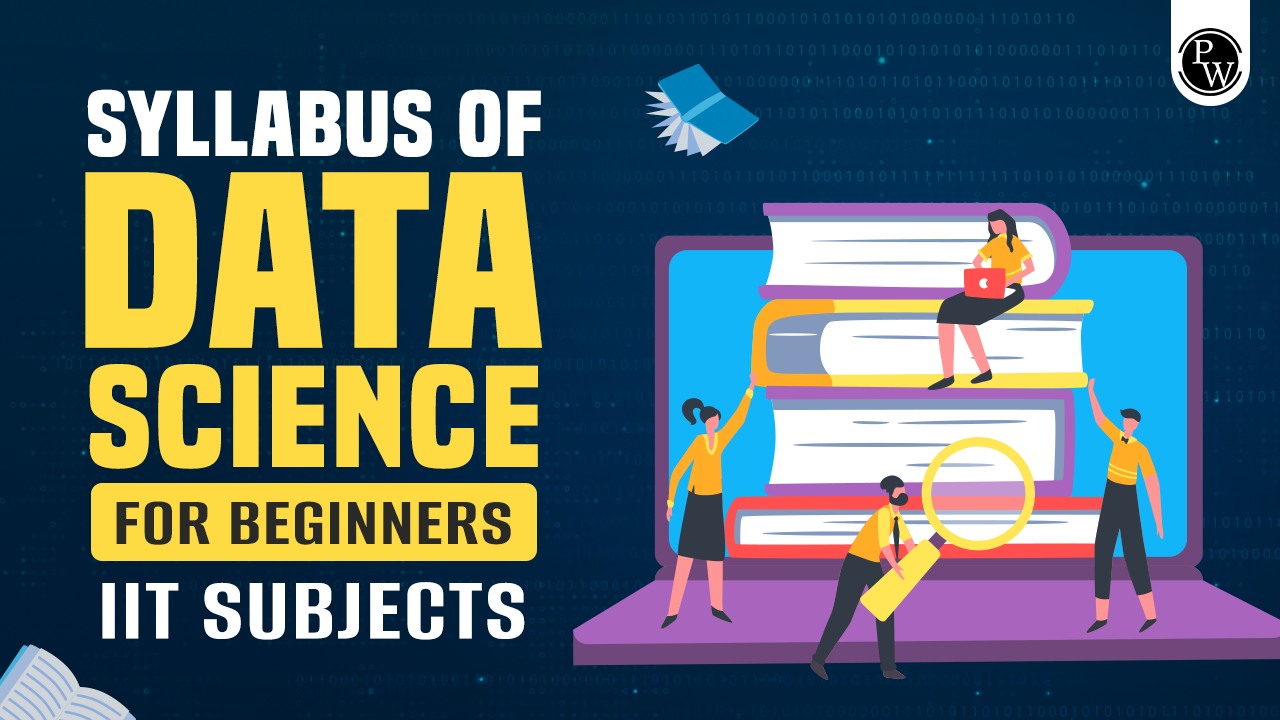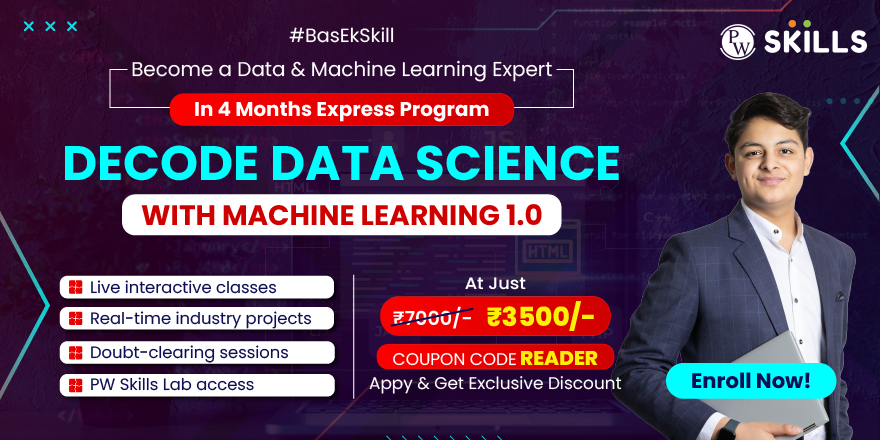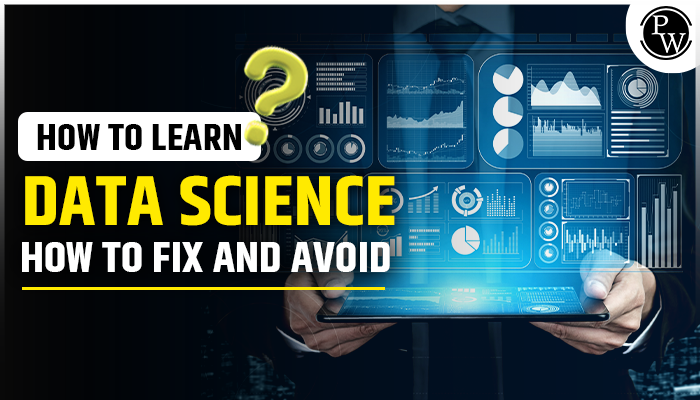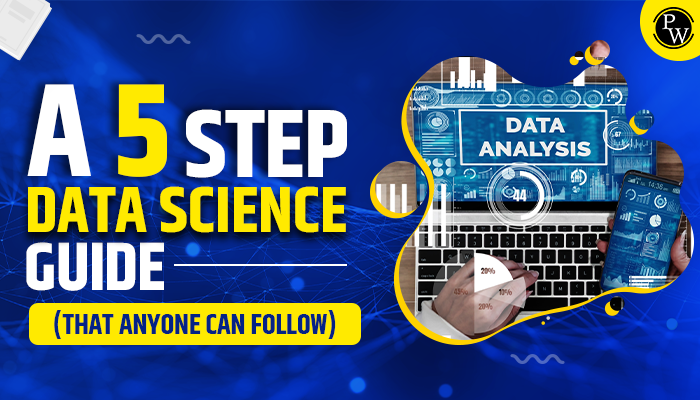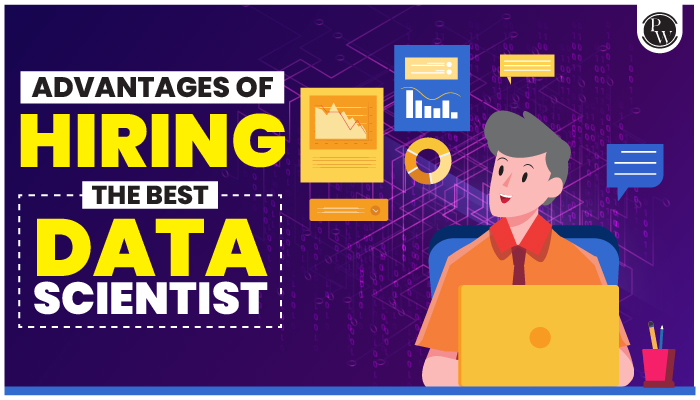A data science course syllabus for beginners equips students with the skills to work with various types of data, whether structured or unstructured, using a variety of tools and software. Before choosing a college, university, or course for a data science program, you should know what the course will cover. Regardless of whether you opt for an online, classroom-based, or full-time degree in data science, the core subjects typically remain the same. These core subjects encompass Statistics, Programming, Machine Learning, Artificial Intelligence, Mathematics, and Data Mining, which are essential components of any data science curriculum.
While the fundamental data science syllabus remains consistent across different data science degrees, the specific projects and elective courses may vary. Let’s see more about the data science course syllabus for beginners in detail.
If you want to learn full-stack data science sitting at home, there’s no better course than Full Stack Data Science Pro Course from Physics Wallah. Go ahead and avail the discount!
What is Data Science? What Do Data Scientists Do?
Data science is a field that combines math, statistics, specialized programming, advanced analytics, artificial intelligence, and machine learning with expert knowledge in a specific area. Its main goal is to discover valuable insights hidden within an organization’s data. These insights help in making informed decisions and strategic plans. Data science has become one of the fastest-growing fields in various industries due to the increasing amount of data available. In fact, it’s been referred to as the “sexiest job of the 21st century” by Harvard Business Review. Businesses rely on data scientists to analyze data and provide recommendations for improving their outcomes.
The data science course syllabus for beginners involves several stages, starting with data collection, where different types of data are gathered from various sources. These sources can include structured data like customer information and unstructured data like social media posts or images.
Next comes data storage and processing, where data is organized and cleaned to maintain data quality. Data management teams set the standards for data storage and structure, making it easier to work with the data for analysis and machine learning. Data scientists then analyze the data, exploring patterns and distributions. They use this exploration to generate hypotheses and perform tests. These insights drive decision-making and scalability in organizations.
Finally, the results are communicated through reports and data visualizations, making the insights more understandable for business analysts and decision-makers. Data scientists can use programming languages like R or Python, or dedicated visualization tools to present the data effectively.
Also Check: Data Scientist Job Description: Role, Responsibilities, and More
Components of Data Science Syllabus
The data science course syllabus for beginners is crafted to equip students with the knowledge and skills needed in the world of business. It focuses on applying tools and statistics to tackle real-world organizational challenges effectively. Whether you’re a beginner or an expert, the general Data Science syllabus consists of three essential components:
- Big Data: This part delves into methods and strategies for transforming unstructured data into organized, useful information. It’s crucial for dealing with vast datasets, like clicks, videos, orders, and more, gathered from various sources.
- Machine Learning: Here, you’ll explore mathematical models and algorithms that enable machines to adapt to changing scenarios and tackle business challenges. Machine Learning is invaluable for predictive analysis and forecasting, particularly in finance.
- Business Acumen & Artificial Intelligence: After collecting heaps of data, businesses need experts who can interpret and present this data in a user-friendly manner through visualizations and graphs. Artificial Intelligence plays a vital role in understanding market dynamics, pattern recognition, and driving progress.
Steps to Begin Your Data Science Learning Journey
If you are a beginner, you can follow these steps to begin your data science learning journey.
Establish a Solid Foundation in Mathematics and Statistics
To walk ahead on your data science journey, it’s essential to lay a strong mathematical and statistical groundwork. These fundamental skills provide you with the theoretical base needed in the field. Begin by understanding key mathematical concepts such as variance, correlations, conditional probabilities, and Bayes’ theorem. These concepts form the basis for the statistical problem-solving approaches used in data science.
Acquire Programming Skills with Python and R
After grasping the mathematical concepts, focus on learning programming languages like Python and R. These two languages are highly prevalent in data science, offering versatility and user-friendliness. Python is excellent for handling large volumes of data and excels in tasks like deep learning, web scraping, and workflow automation. On the other hand, R is particularly useful for translating statistical approaches into computer models, thanks to its wealth of statistical packages.
Familiarize Yourself with Databases
Data scientists must be adept at working with databases to retrieve and store the data they analyze. SQL, a widely-used database query language, is essential for these tasks. You don’t need an in-depth understanding of database technologies, but rather a grasp of how relational databases work and knowledge of specific query commands for data retrieval and storage.
Explore Data Analysis Techniques
Data scientists employ various methods for data analysis, depending on the specific problem and dataset. Gain insight into techniques like cluster analysis, regression, time series analysis, and cohort analysis, understanding when to apply each one. While you don’t need to master every data analysis method, it’s crucial to understand when and how to use a specific approach, enhancing your problem-solving skills.
Embrace a Learning Philosophy
Learn, Practice, Love, Repeat Cultivate a deep understanding of what you learn by putting it into practice. Rather than just acquiring surface-level knowledge, implement your knowledge by tackling practical problems. Learning by doing is a powerful way to gain a deep understanding of the concepts you study. For example, if you learn about the weighted mean, implement a program in Python to calculate it.
Get to Know Data Science Tools
Familiarize yourself with data science tools, such as Apache Spark and D3.js, that streamline tasks in the field. You don’t need to master a particular tool at this stage; simply explore their capabilities. At this point, your goal is to gain a basic understanding of various tools and what you can achieve with them. You can delve deeper into specific tools when you enter the workforce or align with the requirements of a particular company.
Engage in Data Science Projects
Consolidate your knowledge by working on personal data science projects. Projects like sentiment analysis or building a recommendation system are excellent examples of how you can apply your skills to real-world scenarios. Choose projects that you are passionate about, as they will motivate you to explore and unearth valuable insights using data.
Cultivate Data Storytelling Skills
Data scientists need to communicate their findings effectively. Master the art of data storytelling, which involves presenting data, narrative, and visualizations in a way that’s understandable to your audience. Data storytelling involves three main components: data, narrative, and visualizations. These elements collectively convey the insights you derive from data analysis in a compelling and understandable manner.
Network within the Data Science
Community Building connections with fellow data science enthusiasts, professionals, and recruiters can provide valuable insights into the industry and enhance your job prospects. Networking offers a multitude of benefits, such as gaining insights into industry trends, understanding the hiring processes of potential employers, and learning how data is used in various industries.
Keep Learning Continuously
The data science field is ever-evolving. Stay updated with industry developments, follow influencers, and read relevant publications to ensure your knowledge remains current.
Also Check: Top 9 Best Data Science Courses to Make You Job Ready in 2023
Conclusion
Data science offers a world of opportunities for those enjoy playing with data or learning data to drive innovation and decision-making. Whether you’re a beginner or an experienced professional, understanding the data science course syllabus for beginners is essential. These components, including Big Data, Machine Learning, Business Acumen, and Artificial Intelligence, provide a solid foundation for a successful data science career.
If you’re eager to move ahead on your data science journey, and want to cover the syllabus at your pace and comfort, choose Full Stack Data Science Pro Course from Physics Wallah. Their expertise and commitment to quality education can help you master the skills required in this dynamic field. Don’t miss out on the chance to become a part of the data science revolution!
FAQs
What is the core focus of a data science course syllabus for beginners?
A data science course syllabus for beginners focuses on equipping students with the skills to work with various types of data using tools and software, enabling them to discover valuable insights within data.
Do data science courses cover the same subjects across different programs?
Yes, regardless of the type of data science course syllabus for beginners, core subjects typically include Statistics, Programming, Machine Learning, Artificial Intelligence, Mathematics, and Data Mining.
Is data science all about math?
Data science careers demand a good understanding of math, as it's essential for working with machine learning algorithms and analyzing data to uncover insights.
Does data science involve a lot of coding?
Indeed, data science requires coding skills, as it relies on languages like Python and R to build machine-learning models and handle big datasets.
How can data science benefit businesses?
Data science can help businesses analyze data to make informed decisions, enhance outcomes, and offer practical applications such as optimizing processes and customer experiences.

